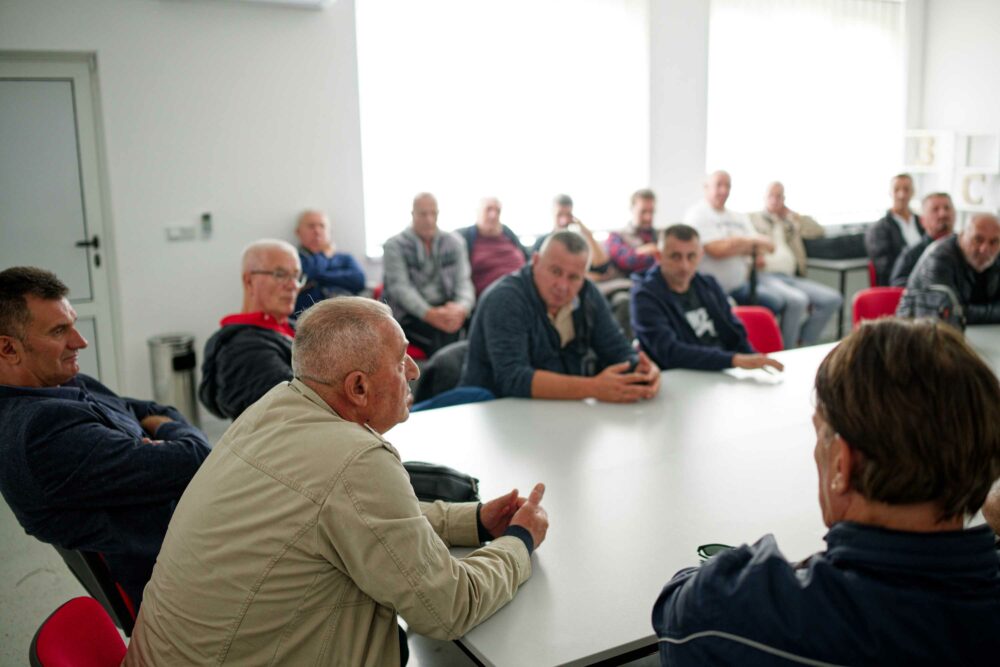In the past year, our work with war veterans featured diverse activities: attending official commemorations, veteran visits and actions to mark unmarked sites of suffering. There were many activities, a good part of them pioneering, and their demands and significance called for a space to come together and time to look back and analyse what was achieved, make plans for the future and share new ideas. In addition to all this, the meeting of war veterans at Mount Ozren in Bosnia and Herzegovina from 23 to 27 September 2024 also included meetings with local authorities and associations in Maglaj, Lukavac and Petrovo.
The group was composed of thirty people – peace activists and war veterans from Serbia, Croatia and BiH. During the workshop part of the meeting, we started from looking back to joint actions and activities organised over the past year. We discussed how we feel about the presence of a mixed group of war veterans when we attend official commemorations, visit sites of suffering and of memory; what was particularly important for us, who we could count on for support, who could count on us for support and motivation, but also the problems and challenges we encountered in certain activities. We also highlighted some actions that were in many ways pioneering and important for our work. Our group of war veterans and peace activists was joined by members of prison camp survivors associations from all three sides, and together we visited places where they had been detained. Our attendance at a number of official commemorations for the first time was of particular importance.
The remainder of the workshop was reserved for joint planning of activities. We agreed on planned actions for 2025 and we have been particularly encouraged and motivated by invitations from war veterans to visit their local communities and have them be our hosts and co-organisers for the planned activities.
Fojnica Bridge of Peace
A tour of Maglaj started with visiting the Fojničani Citizens Association in their Fojnica, a small town near Maglaj. Speaking with Davor Šupuković, the Association’s secretary, we learned more about their work and activities, especially those focused on reconciliation, social and economic cohesion, tourism networks, and inter-entity meetings and cooperation, and we also watched the documentaries “Maglaj, War and Peace” and “Three Towns, Three Nature Parks”.
The main protagonists of “Maglaj: War and Peace” are three veterans of the past war from Maglaj (Rizo Salkić, Boro Jevtić and Marko Zelić) who fought on different sides in the 1992-1995 war. The documentary portrays the past war in Maglaj through the testimonies of these three veterans who give their perspectives on past events, but focus on what they have in common and not what divides them. We met with two of the protagonists and spoke with them. The second documentary showcases potential for further economic and social networking of the area based on the concept of “Three Towns: Three Nature Parks”. A group of activists from Zavidovići, Maglaj and Žepče, three municipalities that were on different sides during the war, has come together around the idea of protecting the environment. They are advocating for laws to protect areas of natural heritage as the basis for developing tourism, protecting plant and animal species and conducting scientific research. They hope this will encourage further trust building and connections among people of the area. We also learned about the idea to turn former front lines into lines of connection through economic cooperation and joint tourism initiatives for the area. We were shown plans for a bridge near Fojnica across the Bosna River, symbolically called the “Bridge of Peace”.
Later, our hosts in Maglaj took us to see the Central Memorial for Shahids and Fallen Fighters – Defenders of Maglaj, the “Velika kuća” Memorial Park commemorating 57 children killed in Maglaj, as well as the Memorial for Civilian War Victims of the Maglaj Municipality. When visiting the memorials, we were joined by Vahdet Hajdić, president of the Maglaj Veterans’ Union who expressed his wish to meet again and establish cooperation.
The visit concluded at the paragliding club on Mount Ozren where our host was Petar Tubić, president of the Doboj Veterans’ Organisation with which our hosts have established successful cooperation.
A Fight We Must Not Lose
We spent the following day in Lukavac and Petrovo. First, we were received by the Mayor of Lukavac Edin Delić at the Town Hall and he then took us on a tour of the town. War veterans and peace activists visited the Memorial for the Srebrenica Genocide Victims in the centre of Lukavac. Delić, a war veteran himself, expressed his wish to expand cooperation and pointed out that this fight to build peace that all of us were pursuing in our own way for the good of our children and their future was the only fight we must not lose.
In the afternoon, we were received at the Petrovo Municipality building by the Mayor of Petrovo Ozren Peković who was pleased by our visit and the importance of our work. He expressed hope and readiness for further cooperation. We visited the Memorial for Fallen Fighters of the 1992-1995 Homeland War in the town centre.
In further activities and talks, we forged a commitment to continue our work together, with special motivation to further strengthen engagement, given the bad political situation in the region, as well as in Europe and the world in general. We are heartened by the readiness and undiminished motivation of the veterans group to continue working, as well as their dedication and commitment. We come away with good impressions from all our encounters in the area and strengthened faith in their commitment to building a better life and lasting peace.

